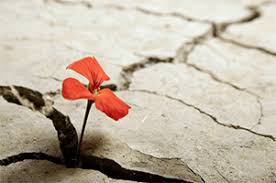
As a great-grandmother living in Israel, I admit that I am not coping well with this war. I want to be a good role model, a source of strength to my children and grandchildren but the truth is that although I’m battling my fear and sorrow, I am not winning.
My oldest granddaughter is studying psychology, and one afternoon I was helping her with her homework. The subject was PTSG Post-Traumatic Stress Growth. PTSG is the ability to not only survive trauma, but to use it to facilitate emotional and spiritual growth. Instead of the traumatic experience crippling the person, it could be transformative.
Interestingly, the age group least resilient in the face of new trauma is the elderly. I was surprised at this; I would have thought that as older folks we’d have more experience dealing with tragedy, more faith to sustain us, and the wisdom to know that this too shall pass and we will be ok. Yet there are reasons why this is not the case.
I made Aliyah in the early seventies as a young secular woman searching for meaning. I wanted to learn about Judaism, get married and raise a family. I believed that Israel was the best place to accomplish these goals.
I confess, and you may consider me a coward, but had I known that my grandchildren would be fighting such a vicious enemy, I may have thought twice before leaving my family to move here. When I first arrived, and for many years after, Israel was a very safe place to live. As a young baalat t’shuva (newly-religious) living in the Old City, my girlfriends and I would pass through the Arab shuk at night without an ounce of trepidation. The day before my wedding, my roommate and I got on an Egged bus, filled with Arab men, to go pray at Rachel’s Tomb. We were the only Jews on the bus, nearly the only women and yet we were not afraid. We got to Kever Rachel, which did not have a cement fortress around it then, spent an hour praying and got back on a bus filled with Arabs to return to Jaffa gate. No one bothered us, no one looked at us, no one said a word. It seemed so ordinary that it wasn’t until years later, during the first Intifada, that it struck me what a peaceful time that had been and how respected (or feared) we were by the local Arabs.
Maybe it’s just me, but I feel I have let my kids down. I thought they would be safe here and avoid the antisemitism I experienced growing up in rural America. Now, my son, the principal of a school for special-needs boys, carries a pistol and the antisemitism is not rural, it’s global. On Oct 7th, my grand-daughter’s sister in-law, a sweet young woman of 19, hid in a small concrete room at her army base with 20 other female soldiers for 12 hours with no electricity, water, air or toilet. So the safe place I chose to raise my kids turns out to be dangerous and despised.
PTSD can also affect older people because new traumas can trigger old traumas and I (like most seniors) have had my share. I have buried a son and nearly lost a daughter. My sister suffered a terrible illness and became a paraplegic. And the list goes on. We all have sorrows, and I am not unique. But I know pain and I’m petrified of more. Like me, most old folks have already been through the ringer.
According to the study I read with my granddaughter, another reason older people can be less resilient is because they don’t have little kids around to pull them out of themselves. I survived the loss of my baby largely because I had another child that needed a functioning, happy mother. Caring for him got me out of bed in the morning and kept me busy all day. Soon I was expecting another child, which gave me great comfort as well. Losing a child is excruciating because it’s our job as parents to protect our children. You feel you failed at your job, no matter the circumstances. Now that my children are in danger of losing their own children, God forbid, I feel helpless, just the way I did long ago when my baby died. And although I am blessed to have little kids in my life, they don’t live with me. I have only myself to pull me out of my despair.
For the aged, most of whom struggle with insomnia, the war has provided more reasons to have trouble sleeping. Sleep deprivation can impair the immune system and contribute to poor health–which leads to more depression. Another reason why older people are more vulnerable to PTSD as opposed to PTSG is being retired from active work. Having a routine, being with others and feeling productive are ways to beat the blues and feel useful. It can be a challenge for the elderly, who have limitations, to gain any satisfaction from helping the nation cope with this war.
In my younger days I was an activist. Now, as much as I would like to demonstrate and travel to army bases, I just can’t. What can I do? I can make small donations. I can pray. But my relationship with God took a nosedive after Oct. 7th. I would like to be a paragon of faith and optimism. I don’t want to look weak in front of my children, But it’s hard.
I was in Budapest six weeks ago where I spoke in a synagogue on Shabbat. There were about fifty people there and I told them that this time around, we, the visiting Israelis who bring pride and inspiration to the Hungarians, need encouragement from them. They suffered through horrendous atrocities and lived to rebuild themselves and their communities. That gives us hope that we, also, will survive and rebuild. After my speech an old man came up and showed me the numbers on his arm. He explained that he was sent to three different concentration camps during the Shoah. He said that he and all his boyhood friends lost their religious faith. Only two years ago did he begin coming back to shul to pray. I was so moved that he shared this with me. I am glad that he found his way back to God after decades of estrangement, but I don’t have that much time. I must strengthen myself spiritually – now – so I can face this reality with courage. I must cling to the belief that despite the corruption that exists among us, it is the Creator of the Universe who is the Master of Wars and He will run this one as He sees fit. And although I am happy to share my opinions with Him, He is not asking for my advice.
When Jacob was aged, all he wanted was to settle down in peace. Hashem said, “Are the righteous not satisfied with what awaits them in the World to Come, that they expect to live at ease in this world, too?!” We all want our golden years to be peaceful and satisfying. But this war has unnerved us to our very core. The earth beneath our feet is shaking. We recognize that as Jews, we are the righteous ones, the moral ones, and we will find our tranquility. But not now; not here.
I met an elderly Israeli couple in the airport on the way back home. The husband was watching CNN on the television at the gate and said to me, “I am 88 years old and I fought in three wars so that my children and grandchildren wouldn’t have to. And now my grandsons are in Gaza and the whole world is against us. I just give up.”
I do not judge him, I understand him. But I don’t want to give up. The Kotzker Rav teaches that “nothing is more whole than a broken heart.” I bless us all, especially the elderly, and pray that somehow, with our fragile hearts and ferocious love for our children and our land, we will find ways to attain PTSG in ourselves and others. And that we may savor our golden years, together.
Yehudit Channen is a writer/editor for different English publications. She has worked as a marriage, bereavement and crisis counselor. Yehudit lives with her husband Rabbi Don Channen who is the co-author with Rabbi Yaakov (Jon) Goldman of The Great Game of Kashrut- Demystifying Kashrut in a Fun and Engaging Way. They live in Ramat Beit Shemesh and are blessed with a large family. Below is the link to The Great Game of Kashrut comics.
https://greatgameofkashrut.com/product/the-great-game-of-kashrut/
